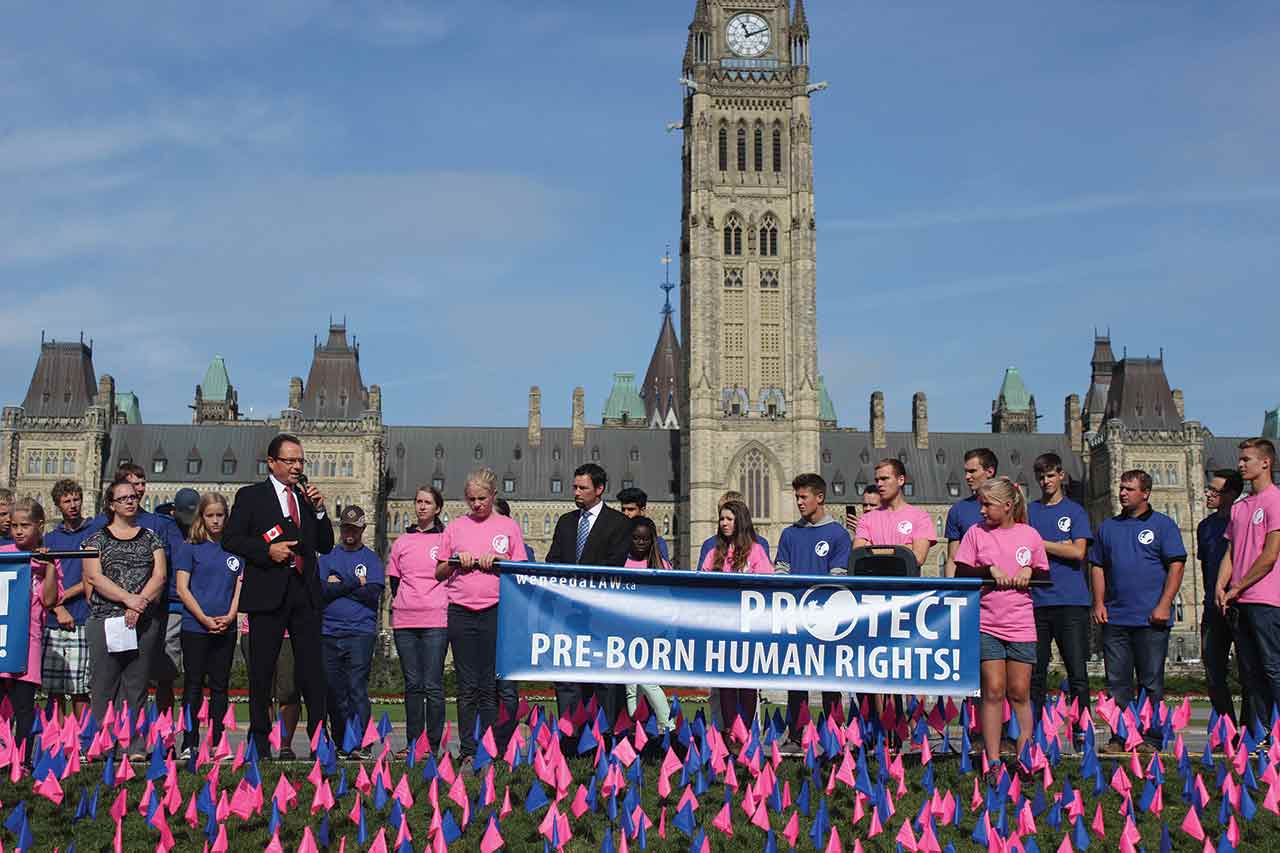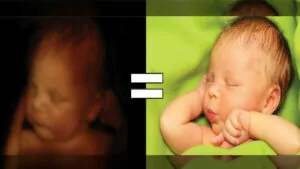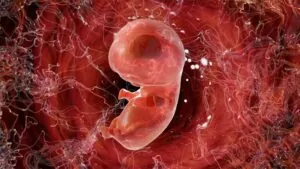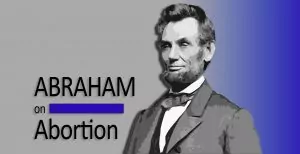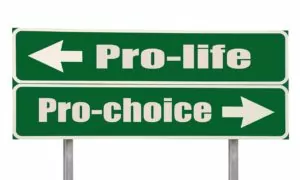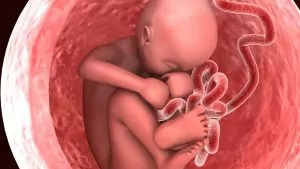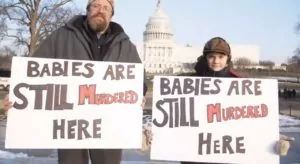
Pro-life - Abortion
An amazing, horrible, inspiring, heart-breaking, simply massive display!
This blast from the past appeared in the magazine 10 years ago in the October 2014 issue.
*****
Some injustices are on such a sheer scale as to be beyond comprehending. That's how it is with abortion in Canada - the number of dead are so large as to seem unreal. What does it mean that the equivalent of a city the size of Chilliwack, or Red Deer, or Brantford are killed each year? When we hear that more than 300 children a day are killed, does that number mean something tangible and understandable to us?
It probably does not – the sheer scale of this evil is just too enormous.
 Our mission, then, was to make the incomprehensible understandable. So on the morning of October 2 the staff of ARPA Canada and more than 80 volunteers headed to Parliament hill to plant 50,000 pink and 50,000 blue irrigation flags on the front boulevard. Each flag represented a child who had been killed by abortion in the last year: 100,000 preborn children are killed each year in our country.
Our mission, then, was to make the incomprehensible understandable. So on the morning of October 2 the staff of ARPA Canada and more than 80 volunteers headed to Parliament hill to plant 50,000 pink and 50,000 blue irrigation flags on the front boulevard. Each flag represented a child who had been killed by abortion in the last year: 100,000 preborn children are killed each year in our country.
Background
This idea of a massive flag display came from my sister, who showed me pictures of some flag displays like it in the United States. The visual impact was impressive. I brought the idea forward to my colleagues. The largest display that we could find in the USA involved about 65,000 flags. Would we be able to pull off 100,000? How would we get permission, who would pay for it, and what impact could it have?
When we first approached Parliament with the idea, we were denied permission. It took multiple tries and a lot of communication from our Legal Counsel Andre Schutten before permission was granted. However, we were not allowed to put the flags into the main lawn that is right in front of Centre Block and the Peace Tower. We had to use the front boulevard. After looking at this closer, we realized that the boulevard had benefits which the front lawn didn’t. It extends much longer, is angled towards the busy Wellington Street, and can’t be missed by most of the MPs and public in the area.
Finding close to 100 volunteers who could commit to a full day wasn't easy, especially given that we decided to keep this project as quiet as possible because we did not want a counter-protest to get all the attention and distract from the powerful message.
Thankfully, about 40-50 brave youth and adults travelled from southern Ontario and as far as Alberta. Another 30-40 from Ottawa came as well, representing both Jubilee church and other ARPA friends from Ottawa’s broader pro-life and Christian community. A strong majority of the volunteers were youth. We are thankful that their parents allowed them to skip school for a day and we are confident that this was an educational experience they won’t forget.
The Day-of
ARPA staff met at 5:30 am, driving in Bruce Deboer’s now famous 15-passenger van, decked out in pro-life graphics and weighed down with 100,000 flags. We dropped the flags off in bundles of 1,000 pink and 1,000 blue, based on our previous calculations for lawn coverage.
At 6:45 the volunteers all met at the Centennial flame, in front of the Peace Tower. Campaign director Mike Schouten explained the procedure for the day, Grassroots director Bruce Deboer detailed the logistics of filling the lawn evenly with the flags, and I led the team in devotions, reading from Psalm 72 which prophetically speaks about our King Jesus Christ and his regard for the vulnerable. Verses from this Psalm are appropriately carved in the Peace Tower that was towering above us.
The volunteers spent the next 1.5 hours inserting flags into the grass, and when the flags were all up we all donned pink and blue t-shirts and brought out the large banners explaining what the display was about. Thankfully, no counter-protest was present and none formed all day. We spent the day handing out colorful cards which explained the cause and pointed to the WeNeedaLAW.ca website.
At 11:00 we held a press conference, accompanied by Members of Parliament Stella Ambler and Harold Albrect. It was an intentional decision to not expand the group of MPs – the goal was that the focus stayed on the grassroots Canadian public calling for justice, not the MPs. But having a respected male and female MP still made it clear to the media that there was a lot of support for what we are doing from within the walls of Parliament.
We continued to distribute the information tracts and talk with the MPs and public until 4:00 pm. The consensus was unanimous – this was an amazing day. But what impact did it have?
Impact #1: Visual
Before the flags were all up I looked down the boulevard and was caught off guard by the sea of flags. It was literally awe-inspiring and heart moving – far beyond what I expected. By the time they were all up, anyone who came to Parliament Hill not only noticed it, they were blown away. From construction workers who were making renovations to one of the Parliament buildings, to the MPs and staff, to the media, all were visibly moved.
The sheer beauty and size of the display led many to ask, “what is this all about?” As soon as we explained it represented 100,000 abortions, it was clear that the message hit home. “Wow” was a constant sentiment we heard.
For example, early in the morning a TV cameraman from one of Canada’s leading national stations came by. He started filming what he saw, turned back towards his office but then stopped, pulled out his camera again and did more filming. When we approached him to ask if he would like to arrange an interview he exclaimed that the visuals of this were so staggering that it did not even need words. He quipped that his editor would not appreciate the fact that he took far more footage than usual – he couldn’t help himself.
Impact #2: Parliament
We were able to interact with dozens of MPs and Senators. Many of them intentionally came out to us to talk, often expressing their immense appreciation and awe. They had never seen anything like this before. As a result, some pro-abortion MPs, like NDP leader Thomas Mulcair, came by to ask what was going on and how we got permission to do this. And pro-life MPs were emboldened. They started tweeting pictures of it, leading their colleagues to do the same.
One MP had told me the day before that he was not comfortable promoting the display and wasn’t sure if he would publicize it. But when he saw it, saw his colleagues promoting it, and saw how peaceful and positive it was, he did at least three tweets about it.
MP Harold Albrecht did an extensive in-studio TV interview with Sun New, about our display. He sounded like an ambassador for WeNeedaLAW and noted that he was so proud to see how civil and positive we were, engaging on such a sensitive issue.
Towards the end of the day I stood outside of Centre block as the MPs were leaving after Question Period. Dozens streamed out and, judging from their responses to our information card, every single one knew what the display was about.
One MP commented to us that early in the morning the MPs in the Parliamentary restaurant were going to the windows, checking out what we were doing as we were setting it up. Another MP said that he was in the elevator with four other MPs and they were asking what it was all about, giving him an opportunity to share exactly what it was about.
Another MP, who we didn’t know prior, was caught off guard by the display as she stepped out of her office. I had a chance to walk with her from her office to Centre Block. By the end of the walk, she asked for pictures of her among the flags and volunteers so that she could share it with her constituency.
One MP was so encouraged by the flags he asked if he could give a video message to our supporters, thanking them (you). You can find that on the WeNeedaLAW.ca website. Watch it and be encouraged.
Impact #3: Media, conventional and social
Early in morning the story had already been picked up a large local radio station so commuters were hearing about it every half-hour on the news. It was featured in two different shows on Sun News (the interview with Harold Albrecht as well as a separate in-studio interview with Mike Schouten). Both of these featured extensive video of the display and our press conference. They were very positive – almost to the point of being a lengthy endorsement. Other TV cameras filmed the display throughout the day, though it is hard to know where this went. We are beginning to see glimpses of it spread throughout the Internet. For example, it was Yahoo News’ featured “photo of the day,” as well as being one of the pictures of the day for BBC News website.
Outside of the mainstream, the story was picked up by the largest pro-life sites in North America as a lead story. But one of the biggest impacts was via social media. Our supporters, including many of you, shared the pictures far and wide – reaching tens of thousands of people from every corner of Canada within hours.
One of our volunteers who lived in Ottawa commented to me that she helped with the flag set-up but then had to go to her university class. She told one of the other students what she was dong early that morning on Parliament Hill. That student happened to be on Facebook at the time and showed her a picture of the display on her feed. Although she was not aware the display was even happening, she was made aware thanks to people who shared the pictures to all their friends.
It was so exciting to get emails and text messages from our friends and supporters from around the country. They were seeing the pictures and cheering us on.
Impact #4: For the volunteers
 Perhaps the most rewarding aspect of the entire display was the impact it had and will continue to have on the volunteers.
Perhaps the most rewarding aspect of the entire display was the impact it had and will continue to have on the volunteers.
Many of the people who helped us had never done anything like this before. Yes, they were aware of the issue and have talked about abortion with family and friends. But it is something completely different to stand on a busy street in downtown Ottawa, wearing a bright t-shirt and engaging passersby about the delicate issue.
One lesson that stands out above most others from my career is that talking and writing about an issue is nothing like having to directly bring that issue to a secular audience. Many of the women walking by have had abortions. Others were experts and professionals. We were 12-year-old students and 67-year-old seniors, and many of us had never done anything like this.
When we take our convictions to the next level – action – it results in changed hearts and minds and gives us the courage and experience to keep doing this the rest of our lives. This makes it easier to apply our faith to other issues and people, including outside of the political realm. As our society becomes increasingly secular, this is so important.
I was moved by the stories from the volunteers who shared the conversations and their responses to people going by. Their parents, pastors, and teachers must have done a good job educating them because they demonstrated grace-filled and truth-filled responses to the difficult questions and challenges. For example, one pro-abortion man challenged a couple of young teen volunteers to stop “imposing their religion” on women and society. By the end of the conversation he said, “you sure know your stuff!”
Never once during the day did I see any of the volunteers acting disrespectfully or responding inappropriately – keep in mind that many were young teens who were skipping school. This was noticed! One MP who we had never interacted with us before was so impressed with the conduct that he joined us after the day was over and made a speech, standing on the edge of the centennial flame fountain, expressing how impressed he was with the witness of the volunteers.
Moving forward
ARPA has made 5 separate display packages, each with 10,000 flags, with the purpose of having them move through Ontario, Manitoba, Alberta, and BC, reaching towns and cities throughout Canada in the years to come. We are looking to you to make use of these! They include banners, information tracts, and t-shirts. And it comes at no cost! We are encouraging that they be used beyond the Reformed community. They can be shared with all pro-life groups. Contact ARPACanada.ca for more information.
We thank God for the freedom, the means, and the level paths that he provided to turn one idea into a strong voice for justice for our preborn neighbors.
